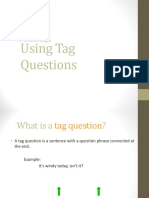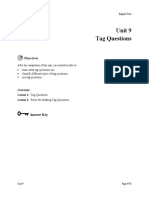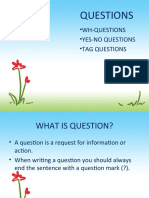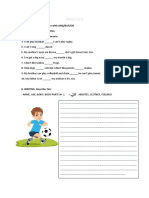0 ratings0% found this document useful (0 votes)
33 viewsNegative Questions
Negative questions are used for three reasons: 1) To get someone to agree with you, 2) To suggest an idea, and 3) To express surprise. They are formed by changing the verb to the negative form using contractions. Tag questions are formed using the auxiliary of the main verb - affirmative main verbs use negative tags and vice versa. Examples are provided of how to use negative questions and tag questions in conversations.
Uploaded by
Hamza BukhariCopyright
© © All Rights Reserved
Available Formats
Download as PDF, TXT or read online on Scribd
0 ratings0% found this document useful (0 votes)
33 viewsNegative Questions
Negative questions are used for three reasons: 1) To get someone to agree with you, 2) To suggest an idea, and 3) To express surprise. They are formed by changing the verb to the negative form using contractions. Tag questions are formed using the auxiliary of the main verb - affirmative main verbs use negative tags and vice versa. Examples are provided of how to use negative questions and tag questions in conversations.
Uploaded by
Hamza BukhariCopyright
© © All Rights Reserved
Available Formats
Download as PDF, TXT or read online on Scribd
You are on page 1/ 11
NEGATIVE QUESTIONS
• They can be used in all verb forms. They are used
for the following 3 reasons:
1. When we want someone to agree with us, even
though the other person might have a different
opinion.
Isn´t this jacket great?
2. To suggest an idea
This dress looks good on you. Don´t you think?
You should buy it.
3. To express surprise
Don´t you like my new car?
NEGATIVE QUESTIONS
STRUCTURE: Change the auxiliaries, modals, and verb
to be to the negative form. USE CONTRACTED
FORMS
Isn´t he sad?
Didn´t they come on time?
Haven´t you heard?
Won’t they come later?
Shouldn’t you do it now?
EXAMPLES
• A: I didn’t eat lunch earlier this afternoon.
B: Why not? Didn’t you have enough time?
A: No, I didn’t. I was too busy on the phone.
• A: I can’t come to the party tomorrow night.
B: Why not? Why can’t you come to the
party?
B: Don’t you want to come?
A: Because I already have plans.
NEGATIVE QUESTIONS IN CONVERSATIONS
• A: I don’t like to eat pizza.
• B: Why not?
• B:Why don’t you like pizza? / Don’t you like
pepperoni? / etc.
• Are you ready for the test tomorrow?
• B: No, I’m not
• A: Why not?________________
MAKE NEGATIVE SENTENCES WITH
THE FOLLOWING IDEAS.
• That vocabulary exercise looks very familiar.
• I won’t be in class tomorrow.
• I don’t like broccoli, cauliflower, bell peppers,
or beans!
• John really wants to have a pet, but he’s
allergic to cats and dogs.
• Jason hasn’t found a job yet.
• Didn’t we do the same exercise last week? /
Didn’t we do this before?
• Why won’t you be here? / Why aren’t you
coming? / etc
• Don’t you like vegetables?
• Why doesn´t he get other kind of pet?
• Why hasn’t he found a job yet? Hasn’t he
asked someone to recommend his Resume?
TAG QUESTIONS
• To form a TAG QUESTION, we use the
AUXILIARY of THE MAIN VERB in the sentence.
• When the main verb is AFFIRMATIVE, the tag
question is NEGATIVE.
– They were at the party, weren’t they?
• When the main verb is NEGATIVE, the tag
question is AFFIRMATIVE.
– He didn’t stay late, did he?
• They live in London, …………………?
• She's Italian,……………..?
• We're working tomorrow, aren't we?
• It was cold yesterday, ……………..?
• He went to the party last night, didn't he?
• We were waiting at the station, ……………..?
• They've been to Japan, haven't they?
• She's been studying a lot recently, ……………?
• He had forgotten his wallet, hadn't he?
• We'd been working, hadn't we?
• She'll come at six, won't she?
• They'll be arriving soon, won't they?
• They'll have finished before nine, won't they?
• He can help, can't he?
• John must stay, mustn't he?
• He should know, shouldn’t he?
You might also like
- Using Tag Questions: BY G. Javier BurgosNo ratings yetUsing Tag Questions: BY G. Javier Burgos34 pages
- New Headway Plus Intermediate: Presented by Assit - Lect. Rafal NaserNo ratings yetNew Headway Plus Intermediate: Presented by Assit - Lect. Rafal Naser18 pages
- Questions: - Wh-Questions - Yes-No Questions - Tag QuestionsNo ratings yetQuestions: - Wh-Questions - Yes-No Questions - Tag Questions23 pages
- Negative Questions Tag Question Reported Speech:Statemenst, Questions, Co Mnands, RequetsNo ratings yetNegative Questions Tag Question Reported Speech:Statemenst, Questions, Co Mnands, Requets19 pages
- Question Tags - The Rules: Subject+ Verb (Positive) .... .., (Negative) Verb+Subject ?No ratings yetQuestion Tags - The Rules: Subject+ Verb (Positive) .... .., (Negative) Verb+Subject ?2 pages
- Sinif 9. Unite Dilbilgisi Konu Anlatimi Ve Etkinlikler Invitations and Celebrations GrammarNo ratings yetSinif 9. Unite Dilbilgisi Konu Anlatimi Ve Etkinlikler Invitations and Celebrations Grammar5 pages
- Do You Speak English? Do You Go Home? Do You Clean The Bathroom? Do You Ride Her Bike? Do You Work in The Supermarket?No ratings yetDo You Speak English? Do You Go Home? Do You Clean The Bathroom? Do You Ride Her Bike? Do You Work in The Supermarket?1 page
- What's A Question Tag?: Click On The Answer You Think Is Right!No ratings yetWhat's A Question Tag?: Click On The Answer You Think Is Right!7 pages
- Welcome To English Iii by Mr. José A. Rodriguez de La VegaNo ratings yetWelcome To English Iii by Mr. José A. Rodriguez de La Vega30 pages
- Questiontags: 1. A Tag Question Is A Short Question (E.G. Have You? / Haven'T You?) ThatNo ratings yetQuestiontags: 1. A Tag Question Is A Short Question (E.G. Have You? / Haven'T You?) That3 pages
- Question Tags Grammar Drills Grammar Guides - 12899No ratings yetQuestion Tags Grammar Drills Grammar Guides - 1289911 pages
- Negative Questions: Question Word Verb 1 Subject Verb 2 ComplementNo ratings yetNegative Questions: Question Word Verb 1 Subject Verb 2 Complement2 pages
- Printed On: 28-03-2022: Muhammad Hamza AkbarNo ratings yetPrinted On: 28-03-2022: Muhammad Hamza Akbar1 page
- Process Writing Article With Teaching Notes AddedNo ratings yetProcess Writing Article With Teaching Notes Added5 pages
- 30 - FGCU - Creative - Writing - Dialogue (1) - 1No ratings yet30 - FGCU - Creative - Writing - Dialogue (1) - 12 pages
- Complete The Sentences Using The Correct Question TagsNo ratings yetComplete The Sentences Using The Correct Question Tags2 pages
- Slim 2. Cheap 3. Spinster 4. Live-In Lover 5. Boyfriend 6. Chick, Broad, Female HumanNo ratings yetSlim 2. Cheap 3. Spinster 4. Live-In Lover 5. Boyfriend 6. Chick, Broad, Female Human4 pages
- Sagwa the Chinese Siamese Cat Bow Wow Meow 1st Printing Edition George Daugherty - The ebook is ready for download, no waiting required100% (1)Sagwa the Chinese Siamese Cat Bow Wow Meow 1st Printing Edition George Daugherty - The ebook is ready for download, no waiting required54 pages
- Unit 2 I'll help to clean up the city parks.(选拔卷)-【单元测试】2021-2022学年八年级英语下册尖子生选拔卷(人教版)(解析版)No ratings yetUnit 2 I'll help to clean up the city parks.(选拔卷)-【单元测试】2021-2022学年八年级英语下册尖子生选拔卷(人教版)(解析版)16 pages
- The Tale of Custard The Dragon Padhai Ak Mazza Best Notes For 2023 Board ExaminationNo ratings yetThe Tale of Custard The Dragon Padhai Ak Mazza Best Notes For 2023 Board Examination8 pages
- Grade 1 Maths - Length - Shorter and Taller Activity Sheets BW-đã G PNo ratings yetGrade 1 Maths - Length - Shorter and Taller Activity Sheets BW-đã G P54 pages
- Anim Anim Anim Anima A A ALS LS LS LS: Pets Pets Pets PetsNo ratings yetAnim Anim Anim Anima A A ALS LS LS LS: Pets Pets Pets Pets3 pages
- Fumiko Hayashi - The Beautiful Dog-Shelley Marshall (2016)No ratings yetFumiko Hayashi - The Beautiful Dog-Shelley Marshall (2016)9 pages
- Complete Download Violence on the meek Stuart Bray PDF All ChaptersNo ratings yetComplete Download Violence on the meek Stuart Bray PDF All Chapters22 pages
- Quicktest 6 Grammar: Tick ( ) A, B, or C To Complete The SentencesNo ratings yetQuicktest 6 Grammar: Tick ( ) A, B, or C To Complete The Sentences3 pages
- New Headway Plus Intermediate: Presented by Assit - Lect. Rafal NaserNew Headway Plus Intermediate: Presented by Assit - Lect. Rafal Naser
- Questions: - Wh-Questions - Yes-No Questions - Tag QuestionsQuestions: - Wh-Questions - Yes-No Questions - Tag Questions
- Negative Questions Tag Question Reported Speech:Statemenst, Questions, Co Mnands, RequetsNegative Questions Tag Question Reported Speech:Statemenst, Questions, Co Mnands, Requets
- Question Tags - The Rules: Subject+ Verb (Positive) .... .., (Negative) Verb+Subject ?Question Tags - The Rules: Subject+ Verb (Positive) .... .., (Negative) Verb+Subject ?
- Sinif 9. Unite Dilbilgisi Konu Anlatimi Ve Etkinlikler Invitations and Celebrations GrammarSinif 9. Unite Dilbilgisi Konu Anlatimi Ve Etkinlikler Invitations and Celebrations Grammar
- Do You Speak English? Do You Go Home? Do You Clean The Bathroom? Do You Ride Her Bike? Do You Work in The Supermarket?Do You Speak English? Do You Go Home? Do You Clean The Bathroom? Do You Ride Her Bike? Do You Work in The Supermarket?
- What's A Question Tag?: Click On The Answer You Think Is Right!What's A Question Tag?: Click On The Answer You Think Is Right!
- Welcome To English Iii by Mr. José A. Rodriguez de La VegaWelcome To English Iii by Mr. José A. Rodriguez de La Vega
- Questiontags: 1. A Tag Question Is A Short Question (E.G. Have You? / Haven'T You?) ThatQuestiontags: 1. A Tag Question Is A Short Question (E.G. Have You? / Haven'T You?) That
- Question Tags Grammar Drills Grammar Guides - 12899Question Tags Grammar Drills Grammar Guides - 12899
- Negative Questions: Question Word Verb 1 Subject Verb 2 ComplementNegative Questions: Question Word Verb 1 Subject Verb 2 Complement
- Italian Dialogues For Beginners (Italian Conversation)From EverandItalian Dialogues For Beginners (Italian Conversation)
- Complete The Sentences Using The Correct Question TagsComplete The Sentences Using The Correct Question Tags
- Slim 2. Cheap 3. Spinster 4. Live-In Lover 5. Boyfriend 6. Chick, Broad, Female HumanSlim 2. Cheap 3. Spinster 4. Live-In Lover 5. Boyfriend 6. Chick, Broad, Female Human
- Sagwa the Chinese Siamese Cat Bow Wow Meow 1st Printing Edition George Daugherty - The ebook is ready for download, no waiting requiredSagwa the Chinese Siamese Cat Bow Wow Meow 1st Printing Edition George Daugherty - The ebook is ready for download, no waiting required
- Unit 2 I'll help to clean up the city parks.(选拔卷)-【单元测试】2021-2022学年八年级英语下册尖子生选拔卷(人教版)(解析版)Unit 2 I'll help to clean up the city parks.(选拔卷)-【单元测试】2021-2022学年八年级英语下册尖子生选拔卷(人教版)(解析版)
- The Tale of Custard The Dragon Padhai Ak Mazza Best Notes For 2023 Board ExaminationThe Tale of Custard The Dragon Padhai Ak Mazza Best Notes For 2023 Board Examination
- Grade 1 Maths - Length - Shorter and Taller Activity Sheets BW-đã G PGrade 1 Maths - Length - Shorter and Taller Activity Sheets BW-đã G P
- Anim Anim Anim Anima A A ALS LS LS LS: Pets Pets Pets PetsAnim Anim Anim Anima A A ALS LS LS LS: Pets Pets Pets Pets
- Fumiko Hayashi - The Beautiful Dog-Shelley Marshall (2016)Fumiko Hayashi - The Beautiful Dog-Shelley Marshall (2016)
- Complete Download Violence on the meek Stuart Bray PDF All ChaptersComplete Download Violence on the meek Stuart Bray PDF All Chapters
- Quicktest 6 Grammar: Tick ( ) A, B, or C To Complete The SentencesQuicktest 6 Grammar: Tick ( ) A, B, or C To Complete The Sentences








































































































